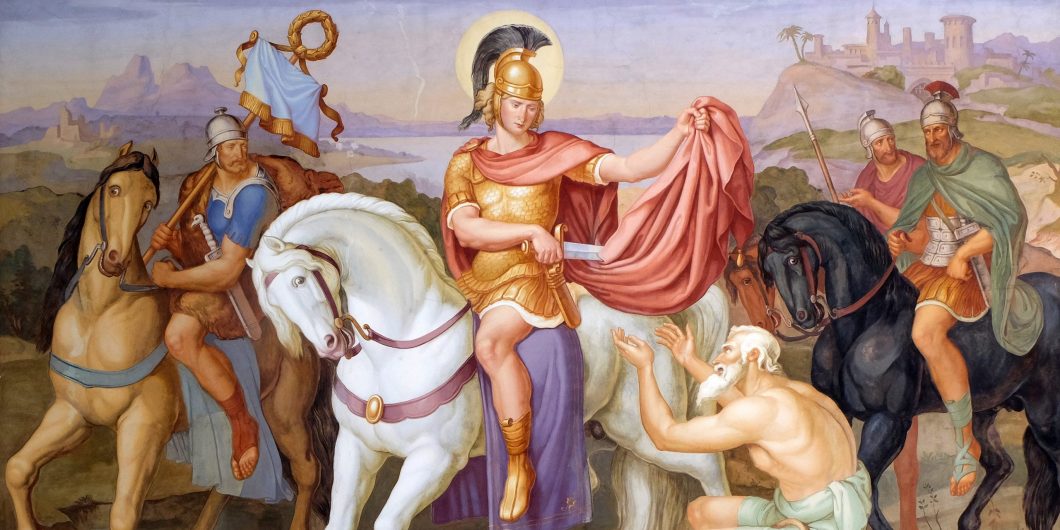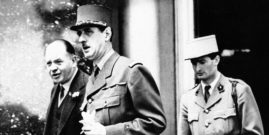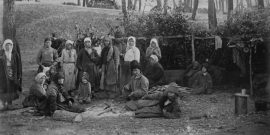Eighty years ago, France suffered perhaps the greatest humiliation in its history, and de Gaulle rallied the nation to continue the fight.
A Saint for Veterans Day
Veterans Day should be a day of healing as we remember the armistice that ended World War I and those who have fought to defend the American way of life. But how do we explain serving the country to veterans who believe they have fought in futile wars, to military recruiters who just experienced their biggest recruiting failure, or to citizens whose trust in government is at historic lows?
The answer won’t be found in the recent history of November 11 but in a much older story about a Roman soldier named Martin, traditionally known as a patron saint of soldiers. Martin’s courage and charity would be celebrated by later generations on the date of his funeral, November 11, 397. Remembering the day’s deeper history might also remind us of the virtues needed to heal our body politic.
Futility is nothing new in war. November 11—what we celebrate as Veterans Day—was originally Armistice Day, a commemoration of the end of “the war to end all wars.”
At 10:45 am on November 11, 1918, British troops were locked in action with Germans east of the town of Mons. The engagement was interrupted by a frantic soldier on horseback who came galloping through the formation shouting “The war’s over! The war’s over!” Those on the front lines thought the soldier was shell-shocked, but they soon received confirmation that a hasty armistice had just concluded the war. By 11 am on the 11th day of the 11th month, the guns went silent.
This was a day that would henceforth be tied up with patriotism, but the boys on the front lines had seen the limits of devotion to their country. A generation of young men had just sacrificed themselves in droves on the altar of the nation-state. One such victim was Wilfred Owen, an Englishman serving on the front lines in France who is known today for his war poetry. His most famous poem describes the deceit of patriotism. It is an “old lie,” he wrote, that “it is sweet and right to die for one’s country.”
Susan and Tom Owen, Wilfred’s parents, were celebrating Armistice Day when a telegram arrived informing them of their son’s death a week before the peace. They wept as the town rang the church bells in jubilation.
Wilfred was right about the antiquity of “patriotism” and the “old lie.” He was quoting the Latin poet Horace, who had described the civic militarism of Roman citizen-soldiers. Horace had fought at the Battle of Philippi, where the Roman Republic breathed its last. He knew how Roman republicans had served their patria—the term for homeland, fatherland, or country—by killing and dying for it.
But Horace was lying. He knew nothing about killing and dying for a cause. Horace had fled the battlefield and later wrote the poem to describe how he hopes men will fight after the republican defeat. He had now become a propagandist reshaping patriotism in a more personal sense of patria. No longer would Rome’s citizen-soldiers kill and die for their fatherland. Rome’s soldiers now fought for the autocratic “father” of all Romans: the emperor.
For the next four centuries patriotism centered on the idea of an all-encompassing empire led by an all-powerful emperor. At the end of this period, another Roman soldier named Martin made a stand against this father-emperor with a different sort of patriotism in mind. Martin of Tours was a military brat whose father literally sent him in chains to a Roman recruiter. Seen by his father as too soft and too interested in religion, Martin would “become a man” while fighting for Rome.
Despite the circumstances of his enlistment, Martin’s fellow soldiers appreciated his guilelessness, kindness, and fidelity. He may have even served as an army physician under his unit’s military tribune. The two soldiers had a close relationship and almost certainly experienced combat together on the Rhine frontier. The most famous story during this time is how Martin cut off his cloak and gave it to a beggar who needed the warmth to stay alive in the bitter winters of Gaul.
Martin’s time in the army came to a close when the emperor Julian was campaigning along the Rhine. Martin requested his discharge, and Julian publicly accused him of treason and arrested him. Martin held his ground, insisting that his time for serving his country was over. Now he must serve God and those less fortunate. He even volunteered to stand unarmed in the coming battle to prove his point. Those who knew Martin understood this was no bluff. Julian backed down.
Martin was arguing that there were things higher than country and more important than political leaders. The soldier now longed for peace and the opportunity to benefit Roman society by building instead of destroying.
If we view Veterans Day as merely an opportunity to honor those who have fought in wars, then we miss the insights of soldiers like Martin and the greater objectives of seeking peace, practicing charity, and protecting human dignity.
Martin tried to become a Christian hermit, but his well-known piety and charity forced him back into a different kind of service. He was kidnapped by the people of Tours and forced to become a bishop. The people loved Martin because he rejected those who used Christianity to gain power and riches. Instead, Martin dedicated his time to the contemplative life and to serving the poor, the oppressed, and the sick. He even used his position as bishop to defend religious freedom and confront Roman authorities when they tried to use law or state power for personal or partisan ends.
Martin was less interested in the political factions and foreign policy of the Roman Empire than he was in individual Roman citizens. He boldly rebuked no less than three emperors face-to-face, interceding for justice on behalf of the innocent and insisting that the emperor had no right to coerce religious belief. At the same time, the humble soldier-saint spent most of his time clothing the needy, personally caring for the mentally ill, and touring the countryside telling the story of a God who loved all human beings regardless of their wealth, status, or bloodlines.
Martin inaugurated a monastic system dedicated to these kinds of ministries by using the military discipline he learned in the Roman army. After his death, November 11 became a great feast day that honored a soldier who served more than his country with more than his sword. It was a day to remember the centrality of kindness, human dignity, and sacrificing for those less fortunate. It was a day to remember a man who believed that some battles of this world are spiritual and that the most courageous soldier disciplines himself to love God and serve others.
November 11 must be more than the commemoration of a peace that ended the most catastrophic war the world had yet seen. In 1918 this peace was hollow for the millions who perished or saw their homelands destroyed, and it led to an even more tragic series of events in the coming decades. Peace was a mirage; the lessons of Armistice Day were bitter.
For Americans, the fighting in these decades led to U.S. dominance on the world stage. It also saw a change to the holiday. Seeking to honor those veterans who had fought after World War I, Congress passed a law in 1954 turning Armistice Day into “Veterans Day.” The day has now become a time to remember those who represent service, sacrifice, loyalty, and duty. When oriented toward noble ends, these are virtues indeed.
Being patriotic on a day like November 11 must mean more than strong words or flag-waving with no actions or commitments. This shallowness can only be countered by citizens who embody what every republic should represent and how any citizen should treat a fellow human being. Republics don’t need patriotism for the sake of patriotism; they need citizens who love their neighbors and do their duty for their communities. And should the need arise, these kinds of citizens will fight for their country because it represents their homes.
Martin knew this better than anyone. By serving his country, he earned the position of standing up to that country when it tested the limits of service. He then used military discipline and martial courage to fight for people’s souls and defend justice for average people.
If we view Veterans Day as merely an opportunity to honor those who have fought in wars, then we miss the deeper meaning of November 11. We miss the insights of soldiers like Wilfred and Martin and the greater objectives of seeking peace, practicing charity, and protecting human dignity. The soldier who fights for these things will never be engaged in a futile cause. The veteran who remembers them will know how to apply his martial skills in peacetime. The young citizen who admires them will be more willing when the recruiter comes to call.



